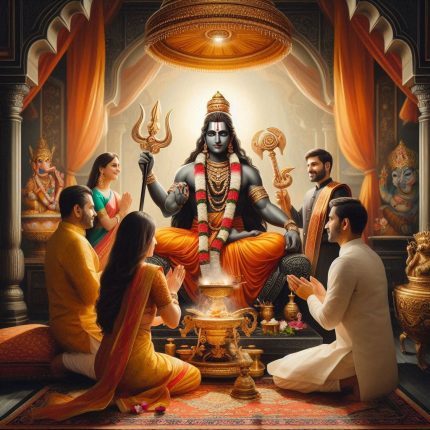Samagri
for Puja:
Haldi [organic] (20gm), Kumkum [organic] (20gm), Tulsi Mala (1), Diya Batti (5), Beetle Nuts (5), Desi Ghee (20ml), Honey (20ml), Jaggery (Gudh) (20gm), Akshata [Yellow rice] (20gm), Yagno-paveetha (5), Karpoora [camphor] (5Tabs), Red/White/Yellow Cloth(1 mtr), Prasad [Laung, Elaichi, Mishri] (20gm), Mouli (25mtr), Ganga Jal (15ml), Durva [fresh] (1), Agarbatti (6)/Dhoop (2), Dakshina (100INR), God Idols (pair), Sambrani (2), Sambrani Holder (1), Kalash [small copper] (1), Panchpatra [small copper] (1), Diya Holder (2), Panchamrit spoon (1), Karpoora Holder(1), includes perishables [Beetle Leaves [fresh] (9), Flowers [fresh] (incl mala), Tulsi [fresh], Mango Leaves [fresh] (7)]
Small Havan:
Cow Dung Cake (2), Mango Wood (250gm), HavanSamagri [20+ Grganic Herbs] (100gm), Ghee (20ml)
Yajman to provide:
Curd (100gm), Milk (100ml), Mithai (250gm), Fruits [5types], Coconut (1), HavanKund, SuchiSarva (Havan Spoon) (1), Kalash [big] (1), Bowl [preferably copper/silver] (1), Spoon [preferably copper/silver] (1), Utensils [2 big Plates (for Aarti/Samagri), disposable Plates, Bowls & Spoons], First solid food (preferably Kheer or Payasam)
Importance and Significance of Mangal Dosh Nivaran Puja
The Mangal Dosh Nivaran Puja is considered essential for those facing challenges related to Mangal Dosh. It is believed that performing this ritual can help balance the energies associated with Mars, leading to improved relationships, better marital prospects, and overall stability in life. The puja serves as a means to express devotion, seek divine intervention, and restore harmony within oneself and one’s surroundings.
Benefits of Mangal Dosh Nivaran Puja
- Mitigation of Astrological Challenges: The puja helps in alleviating the adverse effects of Mangal Dosh, leading to a more balanced and harmonious life.
- Enhancement of Relationships: It promotes better understanding and cooperation in marital relationships, reducing conflicts and misunderstandings.
- Invoking Divine Blessings: Participants seek blessings from deities for peace, prosperity, and success in their personal and professional lives.
- Spiritual Cleansing: The ritual purifies the energy of the individual and their surroundings, fostering a positive atmosphere.
Occasions to Perform Mangal Dosh Nivaran Puja
This puja is ideally performed when an individual or family identifies the presence of Mangal Dosh in their birth chart, especially before significant life events such as marriages. It can also be conducted during auspicious festivals or on specific days deemed favourable for the ritual.
Mangal Dosh Nivaran Puja Vidhi (Procedure)
- Preparation: Participants should dress in clean, traditional attire, symbolizing respect for the sacred ritual.
- Setup: A sacred space is arranged with an altar featuring an idol or image of Lord Hanuman, along with offerings such as flowers, fruits, and incense.
- Invocation: The ceremony begins with the invocation of Lord Ganesha to remove obstacles and ensure a smooth puja.
- Offering Prayers: Participants offer prayers to Lord Hanuman, seeking his blessings to mitigate the effects of Mangal Dosh.
- Puja Rituals: The rituals include chanting specific mantras related to Mars, performing aarti, and making offerings like fruits, sweets, and grains to the deities.
- Havan (Fire Ritual): A Havan may be conducted as part of the puja, where offerings are made into the sacred fire while chanting Vedic mantras, invoking divine energies.
- Blessings: Family members and attendees seek blessings from elders and spiritual guides present, receiving their good wishes for harmony and prosperity.
- Prasad Distribution: The ritual concludes with the distribution of prasad (blessed food), symbolizing shared blessings and gratitude.
Mangal Dosh Nivaran Puja Shubh Muhurat
The Shubh Muhurat for Mangal Dosh Nivaran Puja is typically chosen based on astrological insights to ensure that the timing aligns with favourable planetary positions. Consulting with an astrologer can help identify the best time for the ritual.
By performing Mangal Dosh Nivaran Puja, individuals and families seek to mitigate the challenges posed by Mangal Dosh, inviting divine blessings of peace, harmony, and prosperity into their lives. This sacred ritual serves as a powerful means of fostering spiritual growth, enhancing relationships, and restoring balance within oneself and one’s surroundings.




